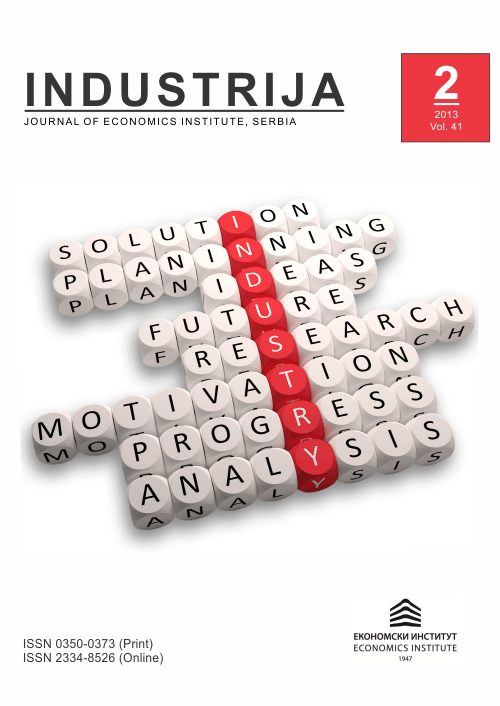The Influence of Knowledge Economy Development on Competitiveness of Southeastern European Countries
Abstract
The purpose of this research is to analyze the influence of knowledge as a vital development resource on competitiveness of Southeastern Europe (SEE) countries. The aim is to identify correlation among the achieved knowledge economy development level measured by the KEI (Knowledge Economy Index) and competitiveness level measured by the GCI (Global Competitiveness Index) in the SEE countries. The study is realized by using descriptive statistics, correlation, regression and comparative analysis. Structurally, the paper is composed of the following parts: analysis of the competitiveness of SEE countries according to the GCI and the KEI, as well as according to the pillars within the KEI, examination of interdependence GCI and KEI and examination of the impact of the pillar within the KEI on GCI in SEE countries. Research results indicate that there is a weak positive correlation between the GCI and KEI. The results of this study provide recommendations to development policy makers in SEE countries.
References
Andriessen, D. (2004). Making Sense of Intellectual Capital – Designing a Method for Valuation of Intangibles. Burlington: Elsevier Butterworth-Heinemann.
Bedford, A. D. (2013). Expanding the Definition and Measurement of Knowledge Economy: Integrating Triple Bottom Line Factors into Knowledge Economy Index Models and Methodologies. Journal of Modern Accounting and Auditing, 9(2), 278-286.
Bratianu, C., & Dinca, V. (2010). Knowledge Economy Dimensions, Review of International Comparative Management, 11(2), 210 – 220.
Brinkley, I. (2006). Defining the Knowledge Economy, London: The Work Foundation.
Chen D., Dahlman C. (2005). The Knowledge Economy, the KAM Methodology and World Bank Operations. World Bank Institute Working Paper No. 37256. Retrieved from http://ssrn.com/abstract=641625 (17.04.2013)
Daniels, J., Radebaugh, L., & Sullivan D. (2002). Globalization and Business. New Jersey: Prentice Hall.
Department of Commerce (DOC), Advisory Committee on Measuring Innovation in the 21st Century Economy. Innovation Measurement: Tracking the State of Innovation in the American Economy. Report to the Secretary of Commerce. Retrieved from http//www.esa.doc.gov/Reports/innovation-measurement-tracking-state-innovation-america-economy (20.04.2013)
Donaldson B., & O' Toole T. (2002). Strategic Market Relationships – From Strategy to Implementation, New York: John Wiley & Sons, Ltd.
Drucker, P. (1992). The Age of Discontinuity – Guidelines to Our Changing Society. New Brunswick: Transaction Publishers.
Foray, D. (2004). The Economics of Knowledge, Cambridge: MIT Press.
Javalgi, G. R., Gross, C. A., Benoy, W. J., Granot, E. (2011). Assessing competitive advantage of emerging markets in knowledge intensive business services. Journal of Business & Industrial Marketing, 26(3), 171–180.
OECD. (1996). The Knowledge-Based Economy. Paris: OECD. Retrieved from http://www.oecd.org/science/sci-tech/1913021.pdf (01.05.2013)
OECD. (2012). New Sources of Growth, Knowledge – Based Capital Driving Investment and Productivity in the 21st Century. Paris: OECD. Retrieved from http://www.oecd.org/sti/50498841.pdf (02.04.2013)
Peters A. M. (2010). Three Forms of the Knowledge Economy: Learning, Creativity and Openness. British Journal of Educational Studies, 58(1), 67 – 88.
Powell, W., & Snellman, K. (2004). The Knowledge Economy. Annual Review of Sociology, 30, 199-220.
Teece, D. J. (2000). Managing Intellectual Capital. Oxford: Oxford University Press.
The Word Economic Forum. (2013). The Global Competitiveness Reports 2012 – 2013. Retrieved from http://www3.weforum.org/docs/WEF_GlobalCompetitivenessReport_2012-13.pdf (15.04.2013)
The World Bank. (2012). Knowledge Economy Index (KEI) 2012 Rankings. Retrieved from http://siteresources.worldbank.org/INTUNIKAM/Resources/2012.pdf (01.05.2013)
The World Bank. Retrieved from http://info.worldbank.org/etools/kam2/KAM_page5.asp (31.04.2013)
Thissen R., Andriesen D., & Deprez Lekanne F. (1999). Creating High – performance Companies trough Value – based Knowledge Management THE KNOWLEDGE DIVIDEND. London: Pearson Education Limited.
Watkins, T., & Yandle, B. (2010). Can Freedom and Knowledge Economy Indexes Explain Go-Getter Migration Patterns? The Journal of Regional Analysis and Policy, 40(2), 104-115.
Wickham A. P. (2001). Strategic Entrepreneurship – A Decision-Making Approach to New Venture Creation and Management. London: Pearson Education Limited.
World Bank Institute. (2004). Benchmarking Countries in the knowledge economy: Presentation of the Knowledge Assessment Methodology (KAM), Knowledge for development program. Retrieved from http://siteresources.worldbank.org/KFDLP/Resources/KAMBoardBriefing.pdf (25.04.2013)
Zitek, V., & Klimova, V. (2011, August). Knowledge economy and Knowledge Infrastructure, Paper presented at the International Conference on Applied Economics, Italy. Retrieved from http://kastoria.teikoz.gr/icoae2/wordpress/wp-content/uploads/2011/10/084.pdf

